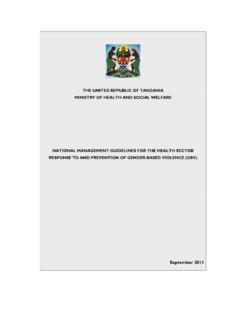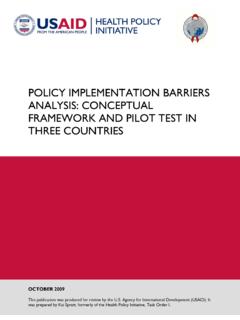Transcription of GENDER-BASED VIOLENCE IN TANZANIA: AN …
1 GENDER-BASED VIOLENCE IN. tanzania : AN ASSESSMENT OF POLICIES, SERVICES, AND PROMISING. INTERVENTIONS. NOVEMBER 2008. This publication was produced for review by the President's Emergency Plan for AIDS Relief. It was prepared by Myra Betron of the USAID | Health Policy Initiative, Task Order 1. The USAID | Health Policy Initiative, Task Order 1, is funded by the Agency for International Development under Contract No. GPO-I-01-05-00040-00, beginning September 30, 2005. HIV-related activities of the initiative are supported by the President's Emergency Plan for AIDS Relief. Task Order 1 is implemented by Futures Group International, in collaboration with the Centre for Development and Population Activities (CEDPA), White Ribbon Alliance for Safe Motherhood (WRA), Futures Institute, and Religions for Peace. GENDER-BASED VIOLENCE IN. tanzania : AN ASSESSMENT OF POLICIES, SERVICES, AND PROMISING.
2 INTERVENTIONS. November 2008. The views expressed in this publication do not necessarily reflect the views of the Agency for International Development or the Government. TABLE OF CONTENTS. Acknowledgments ..iv Executive Summary .. v Abbreviations ..vii I. Overview of GENDER-BASED VIOLENCE .. 1. Definitions .. 1. Health Impacts of GENDER-BASED 2. Economic and Social Costs of GENDER-BASED 4. II. GBV Assessment in tanzania .. 6. Methodology .. 6. Conceptual Framework and Organization .. 7. Limitations .. 7. gender in the Tanzanian Context .. 8. GENDER-BASED VIOLENCE in tanzania .. 10. Harmful Traditional 12. Current Response to GENDER-BASED VIOLENCE .. 15. Health and Psychosocial 16. Community Mobilization/Individual Behavior Change .. 18. III. Conclusions and Recommendations .. 24. Appendix A: Individuals and Groups 31. Appendix B: Who's Doing What?
3 33. Appendix C: Recommendations .. 38. 41. iii ACKNOWLEDGMENTS. This report draws heavily from a previous unpublished report co-authored by Elizabeth Doggett in 2005. (prepared under the POLICY Project for the USAID East Africa Mission). The author thanks Ms. Doggett for her valuable contributions. In addition, the author thanks the following people for their insightful review and comments: Laura Skolnik of USAID/ tanzania and Halima Shariff and Cynthia Greene of the Health Policy Initiative. iv EXECUTIVE SUMMARY. GENDER-BASED VIOLENCE (GBV) is a grave reality in the lives of many women in tanzania . It results from gender norms and social and economic inequities that give privilege to men over women. There is a mounting recognition in tanzania of gender discrimination and gender equity in different facets of life. This awakening includes a growing acknowledgement of how prevalent GENDER-BASED VIOLENCE is and the ways and extent to which it harms not only women and girls but also men and boys and, furthermore, the country's developing economy and health and social welfare systems.
4 The findings of this report are based on a qualitative GENDER-BASED VIOLENCE assessment conducted in tanzania in 2005 and a follow-up visit in 2008. Methods used include key informant interviews and focus group discussions in the 2005 and key informant interviews only in 2008. The findings from the assessment indicate that many forms of GENDER-BASED VIOLENCE , including intimate partner VIOLENCE and rape, are seen as normal and are met with acceptance by both men and women . although the justifications for acceptance differs between women and men, as discussed below. Women and girls are also frequently blamed for causing or provoking GENDER-BASED VIOLENCE . In part due to blame and shame, women and girls rarely report GENDER-BASED VIOLENCE to authorities or seek other kinds of treatment or support. On the other hand, at the policy level, there are signs of support to actively address GBV.
5 For example, President Kikwete has publicly stated that GENDER-BASED VIOLENCE should be included as one of the Millennium Development Goals. 1 Furthermore, tanzania 's Poverty Reduction Strategy Papers (PRSP), the National Strategy for Growth and Poverty Reduction, lists VIOLENCE against women as one of its indicators of poverty a feature that is rare among PRSPs in other countries. Tanzanian law has shown some progress in preventing and punishing GBV crimes. For example, the Sexual Offence Special Provisions Act of 1998 poses harsh penalties for perpetrators of sexual VIOLENCE . However, gaps remain in the legal system. In particular, domestic VIOLENCE is only minimally and vaguely addressed in The Law of Marriage Act although without specified penalties and through the penal codes on general VIOLENCE and assault. There is no law against domestic VIOLENCE , specifically.
6 Recent institutional reforms in government also point to promising paths toward responding to and preventing GBV. For example, each ministry has a gender focal point, and the Ministry of Community Development, gender , and Children has initiated efforts to train the focal points on ways to mainstream gender in their ministry workplans and budgets. Also noteworthy, the Inspector General of the Tanzanian Police Force, Saidi Ali Mwema, has instituted reforms to make the police more accessible to the community and more responsive to the community's needs. Out of this initiative, the tanzania Police Female Network (TPFNet) was created, and with it came the creation of gender desks to respond to cases of GBV at police stations. Despite these incipient reforms, the key informant interviews revealed that the number and quality of services and resources available to survivors of GENDER-BASED VIOLENCE is minimal.
7 While service providers interviewed, including doctors and police, said that they respond to GBV when presented with a case, there are no protocols for working with survivors. Likewise, little training on proper protocols is available to service providers. Legal aid services run by small nongovernmental organizations (NGOs). with limited budgets are available in cities throughout the country, but there is a wide gap in health, counseling, and social welfare services for GBV survivors. There are just two known established shelters for GBV survivors the Young Women Christian Association and House of Peace both located in Dar es Salaam. 1. Interview with UNIFEM representative Salome Onyote. September 18, 2008. v A handful of promising interventions have been or are being implemented by NGOs. Yet, they are limited in scope and number. For example, in refugee settings in northwestern tanzania , the International Rescue Committee provides comprehensive GBV services, including medical treatment, provision of post- exposure prophylactics and emergency contraception, counseling, and legal aid.
8 Kivulini, an NGO in Mwanza, conducts awareness raising, advocacy, and community mobilization with local government leaders, police, health workers, and other civil society organizations to help them recognize their roles in responding to GBV and develop strategies to take action. These activities are beginning to gain momentum, suggesting that Tanzanian society is ready to take on GENDER-BASED VIOLENCE prevention and response efforts. Building on the momentum of existing activities is necessary as is working to ensure that each intervention is coordinated with others and ensuring that communities are involved in planning, owning, and implementing activities. This assessment aims to highlight some of the most promising GBV interventions and identify the most important gaps and opportunities for intervention and coordination. based on the findings, the following key interventions emerge as strategic and reasonable interventions: Legal and policy environment Advocate for a specific law on domestic VIOLENCE Incorporate GBV into HIV policies and plans Assist the Ministry of Community Development, gender , and Children's Affairs (MoCDGC) to revise the GBV plans of action to include strategies for health, HIV, and education Support the MoCDGC to develop a multisectoral GBV network Support the MoCDGC to advocate for budgets in order to implement GBV plans of action Facilitate dialogue among parliamentarians about the health, development, and social impacts of GBV.
9 Assist gender focal points in ministries with addressing GBV issues and developing sector- specific action plans on GBV. Work with local government leaders to translate the GBV plans of action into concrete components of community by-laws Services Reform health centers systematically to address GBV, starting with how-to policies, protocols, and guidelines Incorporate GBV screening and referrals into HIV counseling and testing programs Pilot a one-stop service center for GBV survivors Incorporate a GBV response into HIV counseling and testing programs that have adequate capacity and resources Incorporate GBV curriculum into university health, justice, and legal programs and/or continuing education programs for health professionals Support the TPFNet to train police on GBV and further expand gender desks throughout the country Form peer support and counseling groups by training community members as facilitators Awareness-Raising and Community Mobilization Raise awareness on the problem of GBV and gender equality in the community Engage men and boys in efforts to mobilize communities against GBV.
10 Link GBV and HIV in HIV awareness-raising programs and mass media campaigns Research further the varying types of GBV in tanzania vi ABBREVIATIONS. AFNET Anti-FGM Network AIDS acquired immune deficiency syndrome CDC Centers for Disease Control CEDAW Convention on the Elimination of All Forms of Discrimination Against Women CIDA Canadian International Development Agency FAWE Forum for African Women Educationalists FGC female genital cutting FGM female genital mutilation GBV GENDER-BASED VIOLENCE HIV human immunodeficiency virus IEC information, education, and communication IRC International Rescue Committee KIWAKKUKI Kilimanjaro Women's Group Against AIDS. KIWOHEDE Kiota Women's Health and Development Organization KWIECO Kilimanjaro Women Information Exchange and Consultancy Organization LHRC Legal and Human Rights Centre MEWATA Medical Women Association of tanzania MoCDGC Ministry of Community Development, gender and Children's Affairs MoJ Ministry of Justice and Constitutional Affairs NGO nongovernmental organization PEP post-exposure prophylactic PF3 police form #3.






